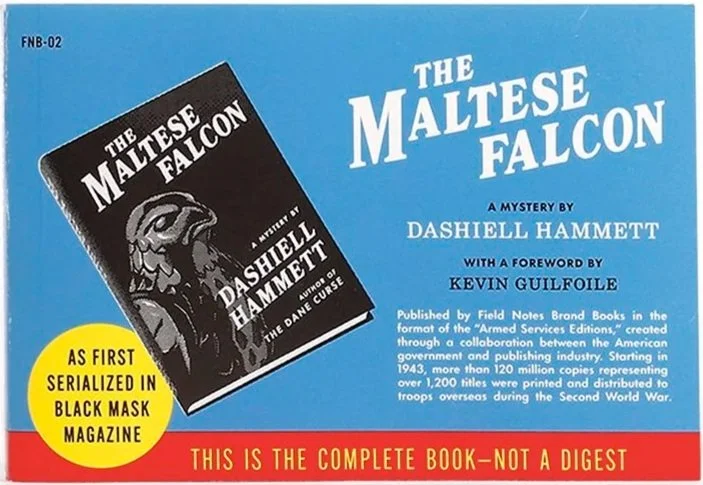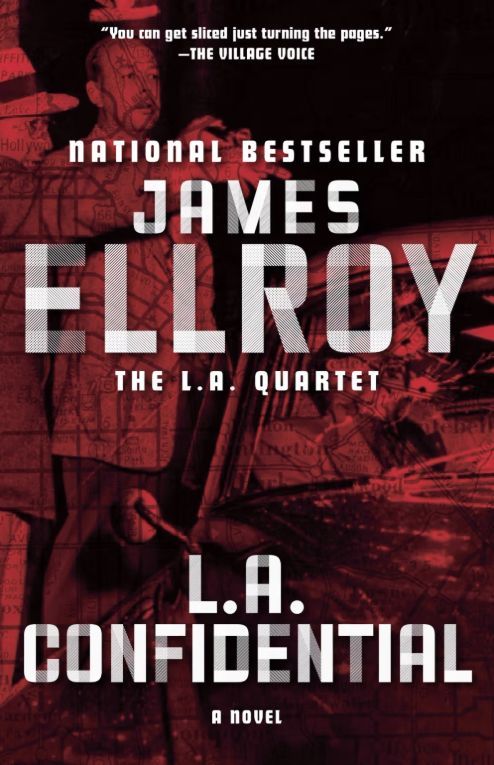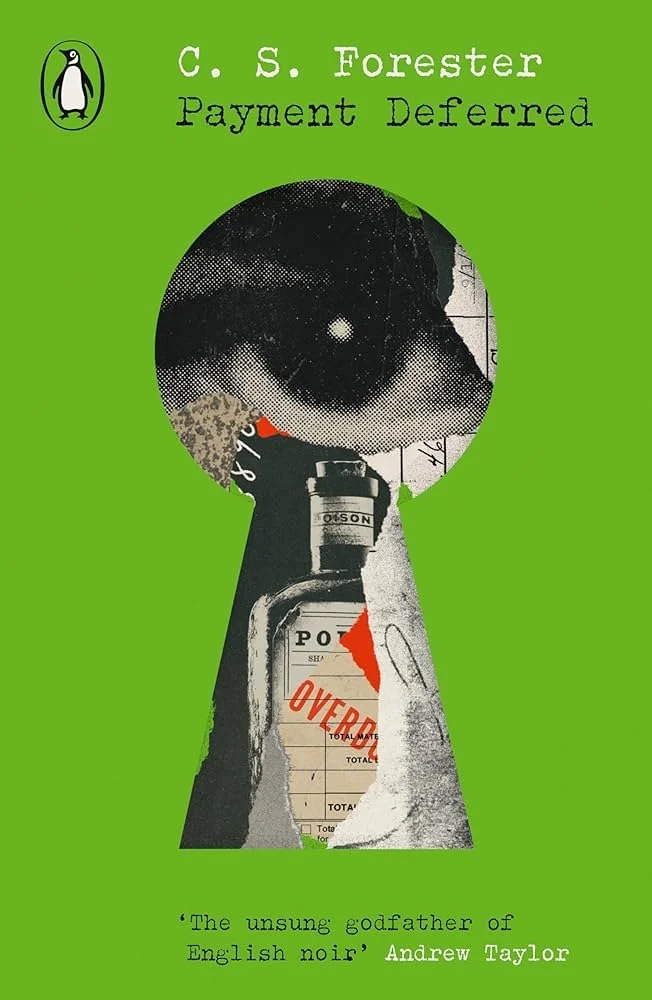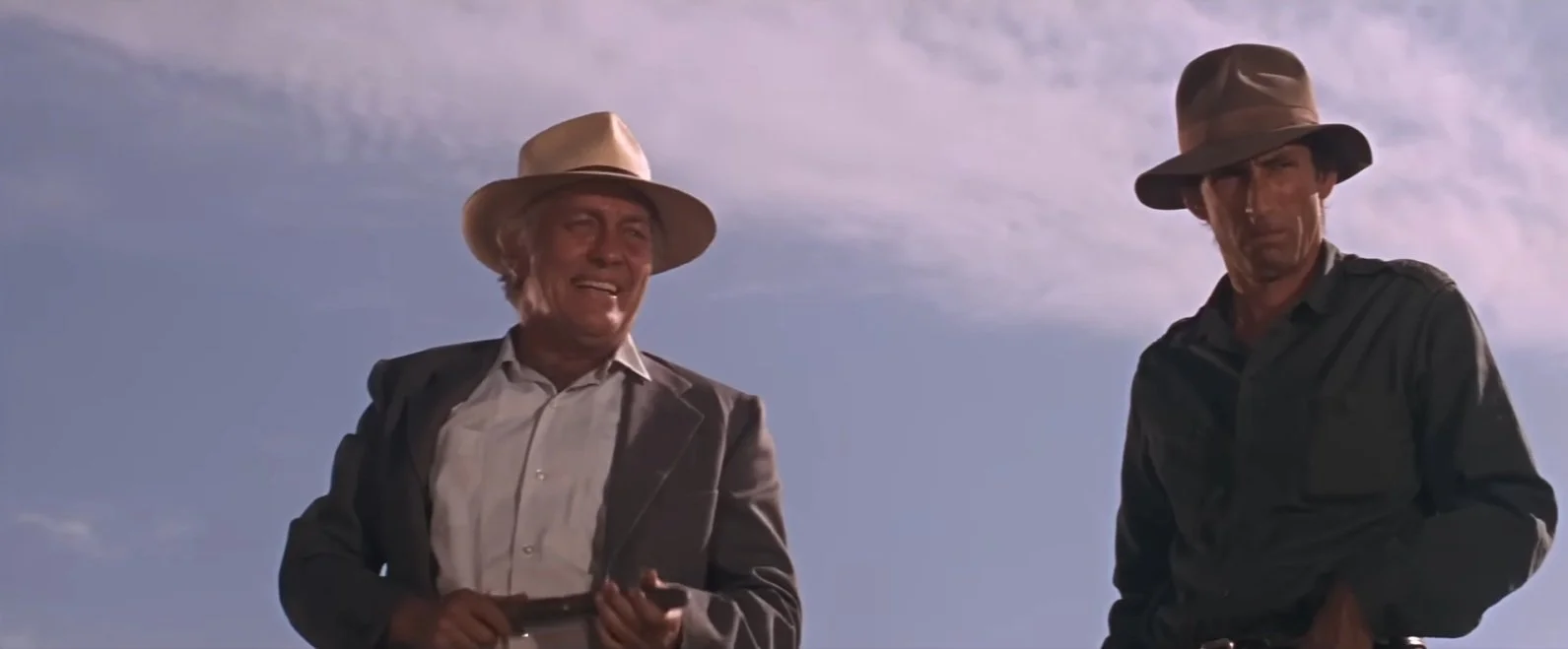Dispatches from the butt-covering trenches
/Earlier this week I received an exciting curiosity: a paperback of The Maltese Falcon in a simulated Armed Services Edition design from Field Notes, my favorite notebook company. Armed Services Editions were pocket-sized paperback books made available for free to GIs during World War II. Over a hundred million ASEs were handed out over the course of the war, and servicemen could enjoy any one of 1300 titles—not including The Maltese Falcon, which Field Notes is belatedly adding to the corpus.
Field Notes’s Maltese Falcon. So cool I can’t stand it.
So this is a cool, fun project at the intersection of several of my interests—history, literature, World War II, and crime fiction—from a company I’ve patronized a long time (my oldest Field Notes are full of sketches and notes for my books, both old and forthcoming). And I’m glad to say the final product is mostly great.
I have no complaints about the quality, the design—which is indistinguishable from a real ASE—and the editorial choices in preparing the text of Hammett’s book, namely the original serialized magazine version. But Field Notes includes an introduction from a novelist who, after explaining the greatness of Hammett’s novel, its place in American crime and mystery fiction, and those editorial choices, drops in the dread one-line paragraph: “It is also a product of its time.”
From two pages of praise he turns to three and a half of apologizing for Sam Spade’s “misogyny,” for Hammett’s “century-old gender stereotypes,” that a villain is portrayed as Middle Eastern and that other characters speculate that he is a homosexual—both aggressions thus “other[ing] him”—and so forth. The novelist tries to muster some feeble goodwill for Hammett by assuring the right-thinking reader that Hammett “was a dedicated anti-fascist* and leftwing activist” and argues that Hammett was actually trying to subvert the benighted standards under which he labored.
It’s tiresome. Like that new edition of The Martian Chronicles I wrote about earlier this year, this is butt-covering on the part of the publisher, a cringing posture of “Don’t be mad at me!” Either introduce a great novel with an argument for its greatness—placing the burden of being a ninny upon the reader, who must decide whether or not to reject it at the first sign of disagreement—or don’t bother at all.
By all means, get yourself a copy of Field Notes’ ASE Maltese Falcon, but skip the introduction. It’s tedious but predictable—a known quantity—and at least the book isn’t censored (as far as I can tell). The other item I noted this week is more sinister.
While picking up some gifts for the kids at Barnes & Noble I stumbled across brand new Vintage editions of James Ellroy’s LA Quartet. Having read The Black Dahlia in college I’ve been meaning to read LA Confidential and the others for years, and considered seizing this opportunity to pick one up. But then I stumbled across this note on the copyright page:
While this book is an outstanding work in the genre, it is also firmly of the time and place—the American 1950s. This book may contain outdated cultural representations and language.
Not only does that first sentence make no grammatical sense—great job, Vintage—it somehow elides Ellroy’s historical fiction with reality, implying that the grungy, lurid world he evokes was the norm.
While this was a fairly standard butt-covering publisher’s note of the kind I’ve looked at here before, it raised my suspicions. After a minute of browsing I spotted a censored slur in an early chapter—rendered with the first letter and a dash—and a few others on adjacent pages. And it was only specific slurs; every other vile word typical of Ellroy’s dialogue was rendered intact.** As it happens, there was an old movie tie-in paperback of LA Confidential on the shelf nearby. I checked the new edition against the old one. Not a word in the original, no matter how offensive, is obscured in this way.
Vintage has censored Ellroy’s books. Further, they have censored them without indicating that they have done so.
I’ve been griping about this happening to long-dead authors for a while—Ian Fleming, Roald Dahl, Agatha Christie, et al—but Ellroy is still alive, still publishing, still giving his manic interviews. And I couldn’t help wondering—is there any other author who would be less cool with this? Part of the point of Ellroy’s fiction, like it or not, is confrontation. His work is in-your-face, gritty and grimy and disturbing to a punishing degree. Softening even part of it for some sensitive suburbanite who picked up an Ellroy novel not knowing what she (and it’s definitely she) is getting into doesn’t just betray Ellroy, it undermines his artistic purpose.
I checked Ellroy’s official website. I don’t know how personally involved he is with it, but he is either fine with the censorship—which seems out of character—or unaware of it. In an announcement for the new Vintage paperbacks, his site declares: “Same great books, great new look inside and out!”
Except that they aren’t the same.
An interesting and frustrating new wrinkle in this story. We’re not out of the woods yet. (Addendum: much like the Fleming estate did with the Bond novels, Ellroy’s audiobooks have been rereleased in censored versions, too.) In the meantime, continue to favor older, unexpurgated editions where you can find them, and always be alert to publisher meddling—even for living authors.
* Indeed, Hammett was such an honest, hardworking anti-fascist that his Stalinist lover Lillian Hellman publicly wished for the Russian conquest of Finland. If we’re worried about an author’s problematic views, why doesn’t that enter the picture?
** This is itself revealing of vast taboos that lie well beyond the scope of a blog post but are worth thinking about.











